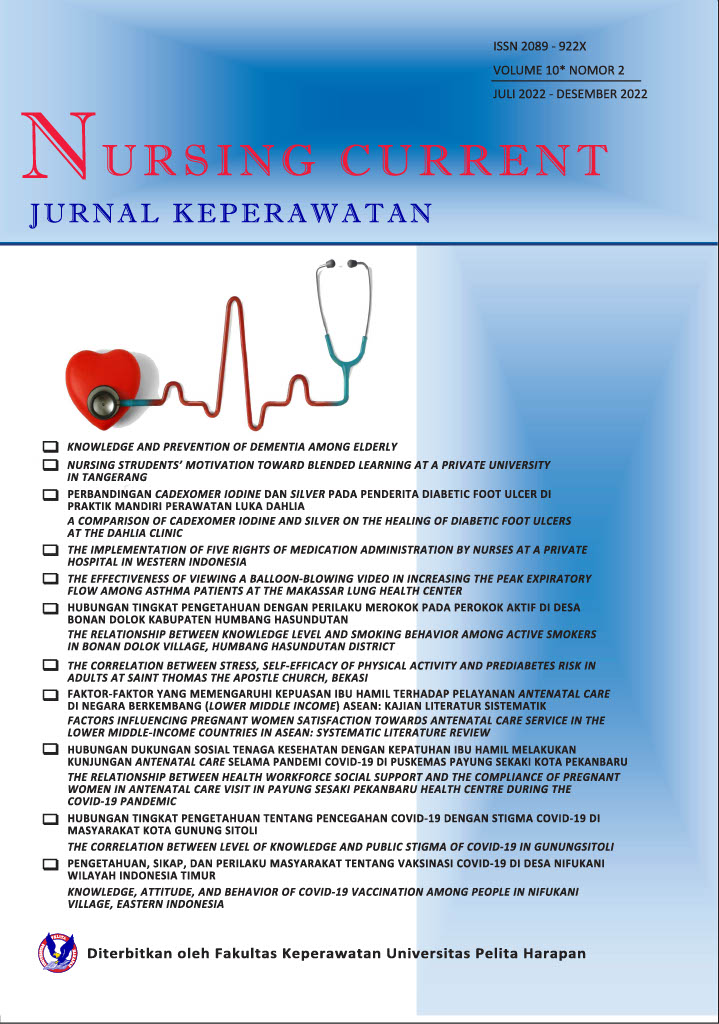HUBUNGAN TINGKAT PENGETAHUAN TENTANG PENCEGAHAN COVID-19 DENGAN STIGMA COVID-19 DI MASYARAKAT KOTA GUNUNGSITOLI [THE CORRELATION BETWEEN LEVEL OF KNOWLEDGE AND PUBLIC STIGMA OF COVID-19 IN GUNUNGSITOLI ]
DOI:
https://doi.org/10.19166/nc.v10i2.5453Keywords:
Covid-19 Prevention, Covid-19 StigmaAbstract
The Covid-19 outbreak was declared a pandemic by the World Health Organization on March 11, 2020. The number of cases both in Indonesia and the world was increasing and impacting society and government policies. Stigmatization for patients suffering from Covid-19 happened in Indonesia, specifically in the Gunungsitoli region. There was a rejection by local people to COVID-19 patients and any burials in 2020. This study aimed to identify the association between the level of knowledge of Covid-19 prevention and the stigma of Covid-19 among people in Gunungsitoli. This quantitative research was conducted with a cross sectional design. The population of study was people living in Gunungsitoli and about 399 sample size was obtained using purposive sampling technique. To obtain the data, the researchers generated a questionnaire using a guideline from the Ministry of Health regarding knowledge level and stigma of Covid-19 (Kemenkes, 2020). The results showed that the residents had good level of knowledge regarding Covid-19 prevention (47.4%), while as the stigma was considered low (59.1%). The results of data analysis using Spearman rank showed a relationship between the knowledge level and stigma of Covid-19, with a correlation value of -0.267. Dissemination of disease prevention that is evenly distributed suppresses the stigma to the patient and the health workers who treat the disease. Health education on Covid-19 prevention needs to be carried out frequently to reduce negative stigma toward Covid-19 patients or health workers who handle the disease.
BAHASA INDONESIA ABSTRAK Penyakit Covid-19 di deklarasikan sebagai pandemi oleh World Health Organization pada 11 Maret 2020. Jumlah kasus di dunia dan di Indonesia meningkat dan memberikan dampak bagi masyarakat serta perubahan kebijakan yang diambil oleh pemerintah. Fenomena sosial berupa stigma bagi pasien yang menderita Covid-19 dialami di Indonesia secara spesifik di kota Gunungsitoli tahun 2020 dalam bentuk penolakan terhadap pasien dan pemakaman jenazahnya. Tujuan penelitian ini yaitu untuk mengidentifikasi hubungan antara tingkat pengetahuan dengan stigma pada pasien Covid-19 di Gunungsitoli. Penelitian kuantitatif ini dilakukan dengan desain cross sectional. Populasi yang diteliti merupakan masyarakat Gunungsitoli yang dengan menggunakan teknik purposive sampling didapatkan sampel 399 orang. Kuisioner pengetahuan tentang pencegahan Covid-19 dan stigma terkait Covid-19 dikembangkan oleh peneliti dengan panduan penatalaksnaan Covid-19 dari Kemenkes (Kemenkes, 2020). Hasil penelitian menunjukkan tingkat pengetahuan masyarakat di Kota Gunungsitoli tergolong baik (47,4%),sedangkan stigma masyarakat tergolong rendah (59,1%). Hasil analisis data menggunakan rank spearman menunjukkan ada hubungan antara tingkat pengetahuan tentang pencegahan dan pengendalian Covid-19 dengan stigma pada pasien Covid-19 dengan nilai korelasi -0,267. Pendidikan kesehatan tentang pencegahan Covid-19 pada masyarakat perlu terus dilakukan untuk menurunkan stigma pada pasien ataupun tenagakesehatan yang menangani penyakit tersebut.
References
Alchawa, M., Naja, S., Ali, K., Kehyayan, V., Haddad, P. M., & Bougmiza, I. (2022). Covid-19 perceived stigma among survivors: A cross-sectional study of prevalence and predictors. The European Journal of Psychiatry. https://doi.org/10.1016/j.ejpsy.2022.08.004
Amin, Y., & Haswita. (2021). Gambaran Stigma dan Diskriminasi Masyarakat Banyuwangi terhadap Covid-19. Jurnal Penelitian Kesehatan, 12, 103-105. https://doi.org/10.33846/sf12nk322
Badan Pusat Statistik. (2018). Profil Generasi Milenial Indonesia 2018: Statistik Gender tematik. Retrieved December 9, 2022, from https://books.google.com/books/about/Profil_generasi_milenial_Indonesia_2018.html?id=HkYfyQEACAAJ
Duan, W., Bu, H., & Chen, Z. (2020). Covid-19-related stigma profiles and risk factors among people who are at high risk of contagion. Social Science & Medicine, 266, 113425. https://doi.org/10.1016/j.socscimed.2020.113425
Graham, C., Zhou, S., & Zhang, J. (2017). Happiness and Health in China: The Paradox of Progress. World Development, 96, 231-244. https://doi.org/10.1016/j.worlddev.2017.03.009
Mujiburrahman, Riyadi, M. E., & Ningsih, M. U. (2020). Pengetahuan Berhubungan dengan Peningkatan Perilaku Pencegahan COVID-19 di Masyarakat. Jurnal Keperawatan Terpadu, 2(2), 130-140. http://jkt.poltekkes-mataram.ac.id/index.php/home/article/view/85/69
Pedoman Tatalaksana - Caiherang. (2020). Retrieved December 9, 2022, from https://caiherang.com/wp-content/uploads/2021/06/Burhan-et-al.-2020-Pedoman-tatalaksana-Covid-19.pdf
Reddy, B. V., & Gupta, A. (2020). Importance of effective communication during COVID-19 infodemic. Journal of Family Medicine and Primary Care, 9(8), 3793-3796. https://doi.org/10.4103/jfmpc.jfmpc_719_20
Simanjuntak, N. H. (2022). Analisis Tingkat Pengetahuan Masyarakat Terhadap Perilaku Pencegahan COVID-19 di Kota Medan. Nommensen Journal of Medicine, 8(1), 43-46. https://doi.org/10.36655/njm.v8i1.740
Turki, M., Ouali, R., Ellouze, S., Ben Ayed, H., Charfi, R., Feki, H., Halouani, N., & Aloulou, J. (2022). Perceived stigma among Tunisian healthcare workers during the COVID-19 pandemic. L'Encéphale. https://doi.org/10.1016/j.encep.2022.08.014
Yanti, B., Wahyudi, E., Wahiduddin, W., Novika, R. G. H., Arina, Y. M. D., Martani, N. S., & Nawan, N. (2020). Community Knowledge, Attitudes, and Behavior Towards Social Distancing Policy As Prevention Transmission of Covid-19 in Indonesia. Jurnal Administrasi Kesehatan Indonesia, 8(2), 4. https://doi.org/10.20473/jaki.v8i2.2020.4-14
Yum, S. (2020). Social Network Analysis for Coronavirus (COVID-19) in the United States. Social Science Quarterly, 101(4), 1642-1647. https://doi.org/10.1111/ssqu.12808
Zheng, M. (2022). Fighting stigma and discrimination against COVID-19 in China. Clinical Microbiology and Infection. https://doi.org/10.1016/j.cmi.2022.10.032Downloads
Published
How to Cite
Issue
Section
License
Authors who publish with this journal agree to the following terms:
1) Authors retain copyright and grant the journal right of first publication with the work simultaneously licensed under a Creative Commons Attribution License (CC-BY-SA 4.0) that allows others to share the work with an acknowledgement of the work's authorship and initial publication in this journal.
2) Authors are able to enter into separate, additional contractual arrangements for the non-exclusive distribution of the journal's published version of the work (e.g., post it to an institutional repository or publish it in a book), with an acknowledgement of its initial publication in this journal.
3) Authors are permitted and encouraged to post their work online (e.g., in institutional repositories or on their website). The final published PDF should be used and bibliographic details that credit the publication in this journal should be included.

This work is licensed under a Creative Commons Attribution-ShareAlike 4.0 International License.


